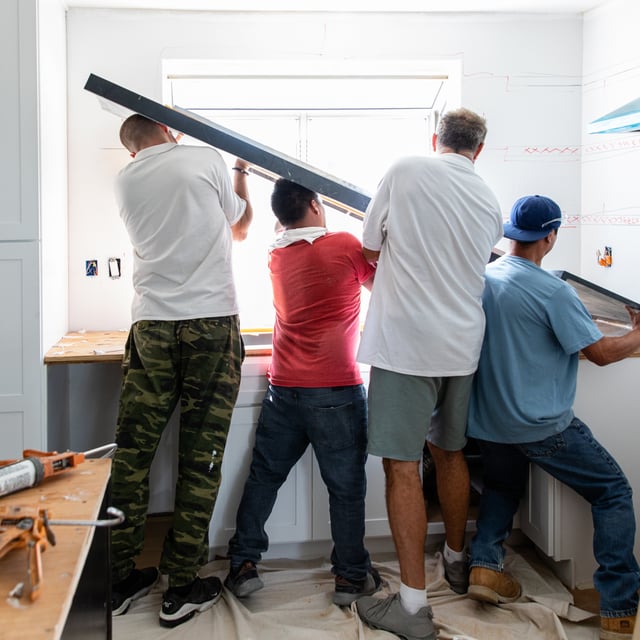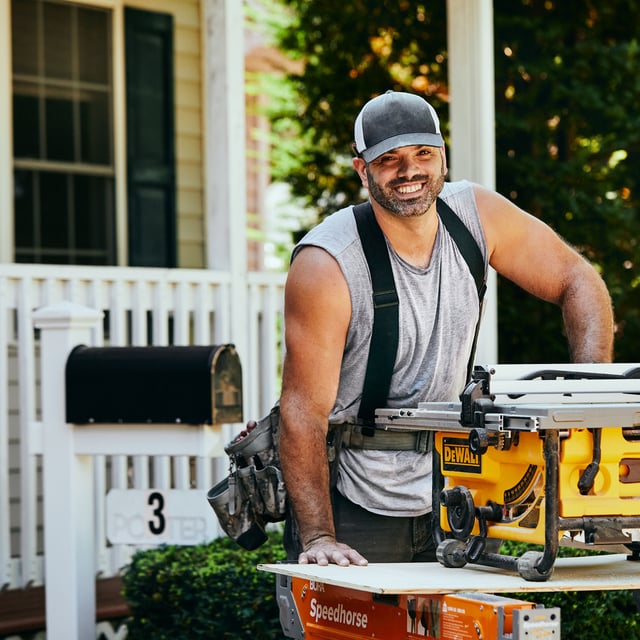
Remodeling
How to Finance a Bathroom Remodel in New Jersey
03.19.2025

In This Article
Finding the perfect contractor is like choosing the right puzzle piece; it must fit just right. Before you start your home remodel or big project, checking if your contractor is properly licensed is really important. Doing a contractor license check might seem overwhelming, but don't worry! In this guide, we’ll keep things simple and clear, so you can move forward with confidence.
A general contractor license is a special approval that lets a person or business work on construction projects legally. This license ensures that the contractor has the necessary knowledge, skills, and experience to manage building projects safely and effectively. It’s like a golden ticket that shows they are qualified to take on jobs that require expertise with structures and safety standards.
Getting this license usually involves passing an exam and meeting certain experience requirements, which vary by state. The license helps protect homeowners by making sure the contractor understands important building rules and laws. It also provides peace of mind, knowing the contractor has met all the legal requirements to do construction work.
Without this license, a contractor might not be able to get the necessary permits for your project, which could lead to complications or delays. Always make sure your contractor has their license up-to-date before they start working. This small step can help make sure your project runs smoothly from start to finish.
Checking a contractor’s license varies from state to state, as each one has its own rules and steps. It's important to know where to look and what information to gather in your specific state to ensure your contractor is legally qualified.
In the following sections, we'll guide you through the process of doing a contractor license lookup in some key states, making it easy for you to get started on your project with peace of mind.
In New York, general contractors aren't required to have a state-level license, but they might need local credentials depending on the municipality. This means it's important to check with your city or county to ensure your contractor has the necessary licensing. However, for specific work like asbestos abatement and crane operations, state-level licenses are mandatory, and these are issued by the New York State Department of Safety and Health.
In Illinois, general contractors aren't required to hold a state-level license, but local credentials may be necessary depending on the municipality. It's important to check with your local city or county to ensure your contractor has all the required paperwork. However, for specific trades like roofing and plumbing, state-level licenses are mandatory, and these are issued by the Illinois Department of Financial and Professional Regulation.
Getting a contractor's license in the US involves several key steps and varies slightly from state to state. However, most states follow a similar process to ensure that contractors meet professional standards and are qualified to handle construction projects safely and effectively. Here are the general steps contractors usually go through to become licensed:
Step 1: Education and Training
Many states require contractors to complete education or training programs that cover essential construction skills and safety practices. These programs often include coursework in project management, building codes, and specialized trades, ensuring contractors are well-prepared for the field.
Step 2: Work Experience
Gathering work experience is crucial, as it allows aspiring contractors to apply their learned skills in real-world settings. This hands-on experience helps them understand industry standards and gain practical knowledge about managing construction projects effectively.
Step 3: Examination
Passing a licensing exam is a critical step where contractors demonstrate their knowledge of building codes, safety regulations, and best practices. The exam is designed to ensure they are equipped to handle projects responsibly and meet professional standards.
Step 4: Background Check
A criminal background check helps verify that the contractor has a clean record and can be trusted in professional settings. This step ensures public safety and maintains client confidence in the contractor’s reliability.
Step 5: Application and Fees
Submitting an application involves providing necessary documentation and paying a fee to the appropriate authority. This formal process confirms that the contractor meets all the state's legal and professional requirements for licensing.
Step 6: Insurance and Bonding
Having liability insurance and being bonded protects both the contractor and clients in case of accidents or disputes. This coverage safeguards against potential financial losses and demonstrates the contractor's commitment to accountability and professionalism.
When hiring a contractor, it’s important to understand both licenses and certifications, as they play different yet crucial roles. While both validate a contractor's skills and abilities, they serve distinct purposes in the construction industry. Knowing the difference can help you choose the right professional for your project, ensuring quality and compliance.
|
Aspect
|
License
|
Certification
|
|
Requirement
|
Legally mandatory for contractors
|
Voluntary, but beneficial for specialization
|
|
Purpose
|
Validates compliance with state/local regulations
|
Demonstrates additional skills and expertise
|
|
Issued By
|
State or local government agencies
|
Professional organizations or educational institutions
|
|
Importance
|
Essential for legal operation
|
Enhances credibility and showcases commitment to the field
|
License
A license is a legal requirement that allows a contractor to operate and work on projects within a particular state or locality. It ensures that the contractor has met basic qualifications and standards set by government authorities. Licenses typically require contractors to pass a specific test and maintain ongoing education to stay current with industry regulations. Holding a license also means the contractor can legally pull permits for projects, which is essential for complying with local building codes.
Examples of Licenses:
Certification
On the other hand, a certification is generally voluntary and indicates that a contractor has pursued additional training or education in a specific area. Certifications can show that a contractor is dedicated to their field and keeps up with industry standards and best practices. They may require periodic renewal, which involves staying updated with new techniques and technologies in the industry. Certifications can make a contractor stand out, showing potential clients their commitment to quality and excellence.
Examples of Certifications:
Both licenses and certifications serve important roles in verifying a contractor’s capabilities and expertise. While a license is fundamental for legal compliance, certifications can highlight specialized skills or advanced knowledge. When hiring, it's good to consider both elements to ensure you find a qualified, reliable contractor.
When it comes to subcontractors and niche contractors, licensing requirements can vary significantly from general contractors. These specialists often focus on a specific area of construction work, such as plumbing, electrical, or HVAC systems. Because of their specialized roles, they may be required to obtain specific licenses beyond a general contractor license to operate legally.
For subcontractors and niche contractors, meeting state and local licensing requirements is crucial. Each trade may have its own set of exams and criteria that need to be fulfilled to ensure the contractor is knowledgeable and skilled in their specific area. Additionally, some states mandate that subcontractors hold a separate business license if they operate as independent entities.
To ensure your subcontractor or niche contractor is properly licensed, it’s important to understand the specific requirements for their trade. Here are some examples of trade-specific licenses:
Making sure your contractor has the necessary licenses helps ensure they are qualified and compliant with all legal and safety standards.
Before hiring a contractor, there are several crucial factors to verify to ensure your project runs smoothly and without unexpected issues. Confirming the contractor’s credentials is a great starting point, but you should also consider other important aspects.
These include verifying their insurance coverage, which protects both you and the contractor in case of accidents or damages. Additionally, ensuring they have worker’s compensation insurance can protect you from potential liabilities if a worker is injured on your property.
Ensuring that your contractor has proper liability and property insurance is crucial to protecting yourself and your home. Always ask the contractor for a certificate of insurance (COI), which will detail:
You can take an extra step by contacting the insurance company directly to verify that the coverage is current and active.
Imagine if a worker accidentally breaks a window or gets injured on-site. Without proper insurance, you might have to cover the repair costs or medical expenses, which could be quite costly. Therefore, avoid proceeding with any contractor who cannot provide proof of insurance, as this ensures you’re not left dealing with unexpected liabilities.
Worker’s compensation insurance is an essential safeguard when hiring a contractor, as it covers medical expenses and lost wages for workers injured on the job. This type of insurance is crucial because it protects both you and the contractor’s employees. Without it, you could potentially be held liable for any accidents or injuries that occur on your property, leading to unexpected costs and legal headaches.
Before hiring a contractor, ask them to provide proof of worker’s compensation insurance. This verification helps ensure that the contractor is compliant with state regulations and is taking responsibility for their workers' safety. Check that the policy is in good standing by contacting the insurance provider directly.
By ensuring the contractor has worker’s compensation insurance, you add an extra layer of protection for yourself. Accidents can happen even in the safest environments, so having this insurance in place gives peace of mind that any unfortunate events will be handled smoothly. Hiring a contractor with proper insurance coverage means fewer worries about liabilities and more focus on completing your project successfully.
Before hiring a general contractor, asking the right questions can help secure a successful remodel and smooth collaboration. Here are some key questions to consider:
Understanding the financial aspect upfront is crucial. A detailed estimate will help you plan your budget effectively.
Knowing the time frame allows you to manage your expectations and plan your schedule accordingly.
It's important to understand how conflicts or unexpected problems will be handled to ensure smooth progress.
References offer insights into the contractor’s reliability and quality of work through firsthand experiences.
Clarifying potential extra costs helps avoid surprises and keeps the project within budget.
Knowing your point of contact and how communication will be managed is key to staying informed and involved.
This helps determine if the contractor is familiar with the specific needs and challenges of your project type.
Certifications can indicate specialized skills and a commitment to quality standards.
A portfolio gives you a tangible sense of the contractor’s style and quality of craftsmanship.
Understanding this process ensures the project complies with local regulations and codes.
Knowing how payments are structured helps you plan your finances and ensures transparency.
It’s important to know who else will be working on your project and verify their qualifications.
Safety practices are crucial for preventing accidents and protecting your investment.
Understanding how delays and changes are managed can help set realistic expectations.
Hiring a contractor can feel overwhelming, but following a vetting process can make it easier. Here's a step-by-step guide to help you choose the right contractor for your project:
Start by clearly outlining what you want to achieve with your project. Know the specific work that needs to be done and any key features you want included. This will help you communicate your vision and expectations effectively to potential contractors.
Ask friends, family, or neighbors for referrals to contractors they trust. Explore online reviews and ratings to find contractors with positive feedback. Utilize local resources like home improvement stores and community groups to identify reputable professionals.
Based on your research and recommendations, create a list of at least 3-5 contractors who seem like a good fit for your project. This will give you several options to consider and compare during the selection process.
Contact the shortlisted contractors for an initial interview. Ask about their experience, availability, and how they plan to approach your project. If they seem promising, arrange site visits where they can assess the project in person and provide a more accurate estimate.
Ask each contractor for a detailed written estimate that includes a breakdown of costs for materials, labor, and any additional expenses. This will help you understand the financial aspects of the project and make an informed comparison.
Reach out to past clients provided by the contractors to inquire about their experiences. Verify the contractor’s licensing and insurance to ensure they meet legal requirements and standards for professionalism.
Review the bids carefully, considering not just the costs but also the quality of materials and services offered. Negotiate terms where necessary to align with your budget while ensuring quality work.
Once you select a contractor, finalize a contract that outlines all project details, including scope, timeline, payment schedule, and warranties. Review the contract thoroughly before signing, ensuring all conditions are clearly stated and agreed upon.
Throughout the project, maintain regular communication with your contractor. Set up check-ins to discuss progress, address any issues, and make sure everything is on track according to your expectations.
By following these steps, you can hire a contractor who is well-suited for your project, helping ensure a successful and stress-free renovation experience.
Conducting a thorough contractor license check is a vital step in ensuring the success and safety of your construction project. By verifying licenses and understanding both the legal and practical aspects of hiring a contractor, you protect yourself from potential risks and liabilities.
This process not only confirms the contractor's qualifications and credibility but also builds a foundation of trust for your working relationship. With these insights, you can confidently move forward with your project, knowing you've made an informed and secure choice.

Renovate confidently with Block
Easily compare quotes from top quality contractors, and get peace of mind with warranty & price protections.
Thousands of homeowners have renovated with Block

4.5 Stars (100+)

4.7 Stars (100+)

4.5 Stars (75+)

Remodeling
How to Finance a Bathroom Remodel in New Jersey
03.19.2025

Remodeling
Should You Renovate Before Selling Your Home?
03.19.2025

Remodeling
How to Renovate in Boston: A Complete Guide
03.19.2025

Remodeling
How to Renovate in New York City: A Complete Guide
03.19.2025

Remodeling
A Complete Guide to Bathroom Renovation Costs in Brooklyn
03.19.2025
Renovate confidently